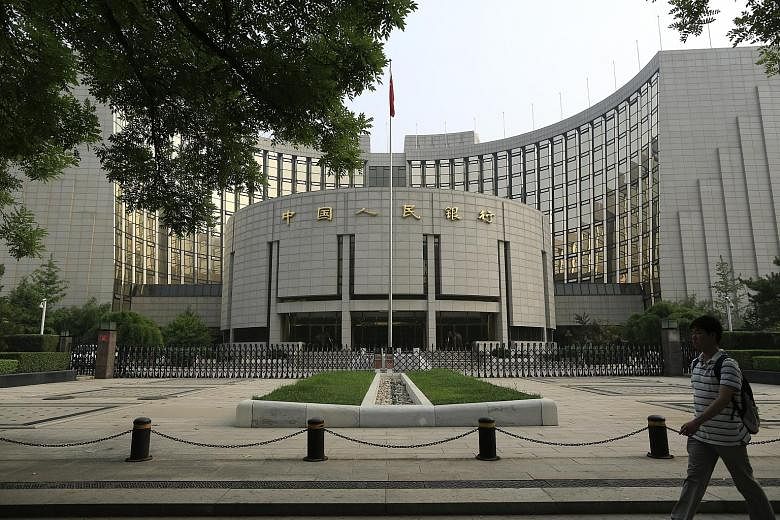BEIJING • China's central bank cut the proportion of funds banks must set aside as reserves, according to a statement yesterday, in the latest attempt to keep growth on track in the world's second largest economy.
The People's Bank of China (PBOC), the central bank, said it would trim the so-called "reserve requirement ratio" by 0.5 percentage point.
Bank governor Zhou Xiaochuan highlighted the scope for further action if needed when he spoke ahead of the Group of 20 meeting in Shanghai last Friday.
His co-host, Finance Minister Lou Jiwei, said China will expand its fiscal deficit to support structural reforms to the economy, which slowed to a 6.9 per cent growth pace last year, the weakest since 1990.
The PBOC has also been trying to restore stability to the nation's currency as capital flows out at a record pace. Reductions to the required reserve ratio - which allow banks to lend more - help compensate for the departure of capital.
The central bank said it lowered the rate to guide stable and appropriate growth in credit and create appropriate monetary and financial conditions for supply-side structural reform, according to a statement on its website.
The move came soon after PBOC fixed its rate for the yuan currency at a four-week low, data showed yesterday.
The move to push the yuan lower comes despite comments by Mr Zhou that there was no basis for further depreciation.
PBOC set the yuan at 6.5452 to US$1, down 0.17 per cent from last Friday, according to the China Foreign Exchange Trade System.
The fix was the weakest since Feb 3, previous figures showed.
The weaker currency hurt sentiment on the stock market, with the benchmark Shanghai Composite Index closing down nearly 3 per cent yesterday after dropping as much as 4.63 per cent.
PBOC's Mr Zhou last Friday told a seminar on the sidelines of the G-20 finance ministers' meeting in Shanghai that the yuan - also known as the renminbi - would be stable.
"There is no basis for persistent renminbi depreciation from the perspective of fundamentals," he said.
The authorities only allow the yuan to rise or fall 2 per cent on either side of the daily fix, to prevent volatility and maintain control over the currency.
"It remains to be seen what the effect on the foreign exchange market is. However, this move suggests that, in the end, supporting growth takes priority over other considerations at the moment," said Oxford Economics economist Louis Kuijs.
The central bank said that it pumped 230 billion yuan (S$49.4 billion) into the financial system yesterday to ease tight liquidity, bringing the total fund injections over the past week to more than one trillion yuan, according to state media.
AGENCE FRANCE-PRESSE, BLOOMBERG

